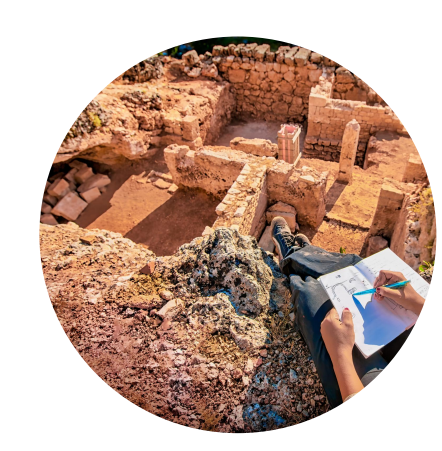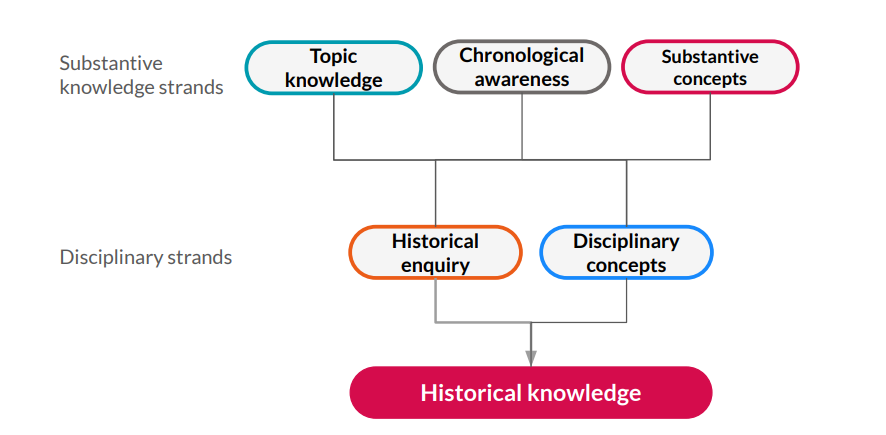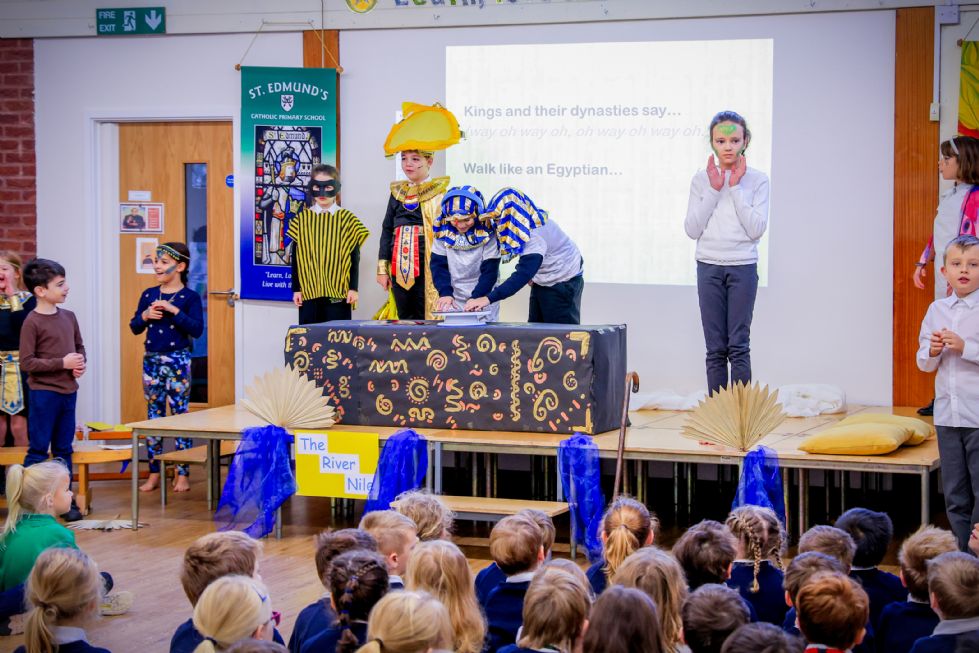History
At St Edmund's Catholic Primary School we follow the Kapow Primary History scheme to support and enhance our planning of the History curriculum.
Intent
|
At St Edmund's we want children to view history as a living field – to feel empowered to act as historians by asking questions and examining sources – rather than as a subject where someone else has all the answers. We encourage children to extend their knowledge by undertaking their own research, and by beginning to develop their own explanations and theories. Our aim is for our pupils to be able to understand and learn from the people from the past who have made the greatest impact. Through the Kapow scheme of work, we aim to build an awareness of significant events and individuals in global, British and local history and recognise how things have changed over time. History will support children to appreciate the complexity of people’s lives, the diversity of societies and the relationships between different groups. Studying History allows children to appreciate the many reasons why people may behave in the way they do, supporting children to develop empathy for others while providing an opportunity to learn from mankind’s past mistakes. Kapow Primary's History scheme aims to support pupils in building their understanding of chronology in each year group, making connections over periods of time and developing a chronologically-secure knowledge of History. We can strengthen this by embedding history across the curriculum – for instance giving a historical dimension to scientific discussions about invention or innovation, or ensuring that a sense of the historical period underpins our approach to literature or British values. Children are encouraged to develop their understanding of the subject through research, which extends their knowledge further. In doing so, they can begin to develop their own explanations and theories for the past, with their own evidence and deeper understanding. The national curriculum for history aims to ensure that all pupils:
|
- Gain historical perspective by placing their growing knowledge into different contexts, understanding the connections between local, regional, national and international history; between cultural, economic, military, political, religious and social history; and between short- and long-term timescales.
We hope to develop pupils’ understanding of how historians study the past and construct accounts and the skills to carry out their own historical enquiries.
In order to prepare pupils for their future learning in History, we introduce children to key substantive concepts including power, invasion, settlement and migration, empire, civilisation, religion, trade, achievements of humankind, society and culture.
Implementation
|
At St Edmund's, we teach History lessons in class with one timetabled lesson per week. This is done for 3 half terms of the year. Our weekly lessons use Kapow as a teaching resource. Kapow Primary’s History scheme of work aims to inspire pupils to be curious and creative thinkers who develop a complex knowledge of local and national history and the history of the wider world. We want pupils to develop the confidence to think critically, ask questions, and be able to explain and analyse historical evidence. Through Kapow’s scheme of work, we aim to build an awareness of significant events and individuals in global, British and local history and recognise how things have changed over time. History will support children to appreciate the complexity of people’s lives, the diversity of societies and the relationships between different groups. Studying History allows children to appreciate the many reasons why people may behave in the way they do, supporting children to develop empathy for others while providing an opportunity to learn from mankind’s past mistakes. Kapow Primary's History scheme aims to support pupils in building their understanding of chronology in each year group, making connections over periods of time and developing a chronologically-secure knowledge of History. We use the following key strands in history:
The Kapow Primary scheme emphasises the importance of historical knowledge being shaped by disciplinary approaches. The substantive knowledge strands of topic knowledge, chronological awareness and substantive concepts lead to the disciplinary strands of historical enquiry and disciplinary concepts, ultimately leading to historical knowledge, as in the diagram above. These strands are interwoven through all History units to create engaging and enriching learning experiences which allow the children to investigate history as historians do. Each six-lesson unit has a focus on chronology to allow children to explore the place in time of the period they are studying and make comparisons in other parts of the world. Children will develop their awareness of the past in Key stage 1 and will know where people and events fit chronologically. This will support children in building a ‘mental timeline’ they can refer to throughout their learning in Key stage 2 and identifying connections, contrasts and trends over time. The Kapow Primary timeline supports children in developing this chronological awareness. Over the course of the scheme, children develop their understanding of the following key disciplinary concepts: • Change and continuity. • Cause and consequence. • Similarities and differences. • Historical significance. • Historical interpretations. • Sources of evidence. Lessons are designed to be varied, engaging and hands-on, allowing children to experience the different aspects of an historical enquiry. In each lesson, children will participate in activities involving disciplinary and substantive concepts, developing their knowledge and understanding o Britain’s role in the past and that of the wider world. Children will develop their knowledge of concepts and chronology as well as their in-depth knowledge of the context being studied. Our curriculum is accessible for all, with support for pupils with SEND and opportunities to challenge those who need it. Kapow provides strategies to support pupils with SEND and ways to challenge prior higher attainers. Teachers will make adaptations to support children with SEND. The external curriculum has been enhanced by visitors and trips linked to historical topics to enhance learning and develop cultural capital.
|
Impact
The impact of Kapow Primary’s scheme can be constantly monitored through both formative and summative assessment opportunities. Each lesson includes guidance to support teachers in assessing pupils against the learning objectives. Furthermore, each unit has a skill catcher and knowledge assessment quiz which can be used at the end of the unit to provide a summative assessment. In Year 2 to 6, the children create a double page spread at the end of each unit to capture what they have learnt.
After the implementation of Kapow Primary History, pupils should leave school equipped with a range of skills to enable them to succeed in their secondary education. They will be enquiring learners who ask questions and can make suggestions about where to find the evidence to answer the question. They will be critical and analytical thinkers who are able to make informed and balanced judgements based on their knowledge of the past.
The expected impact of following the Kapow History scheme of work is that children will:
● Know and understand the history of Britain, how people’s lives have shaped this nation and how Britain has influenced and been influenced by the wider world.
● Develop an understanding of the history of the wider world, including ancient civilisations, empires, non-European societies and the achievements of mankind.
● Develop a historically-grounded understanding of substantive concepts - power, invasion, settlement and migration, civilisation, religion, trade, achievements of mankind and society.
● Form historical arguments based on cause and effect, consequence, continuity and change, similarity and differences.
● Have an appreciation for significant individuals, inventions and events that impact our world both in history and from the present day.
● Understand how historians learn about the past and construct accounts.
● Ask historically-valid questions through an enquiry-based approach to learning to create structured accounts.
● Explain how and why interpretations of the past have been constructed using evidence.
● Make connections between historical concepts and timescales.
● Meet the relevant Early Learning Goals at the end of EYFS (Reception) and the end of key stage expectations outlined in the National curriculum for History at the end of Key stage 1 and 2.
The impact and measure of this is to ensure that children at St Edmund’s are equipped with historical skills and knowledge that will enable them to be ready for the curriculum at Key Stage 3 and for life as an adult in the wider world.
Oracy
Through our History curriculum, pupils have opportunities to develop their oracy skills by:
● Discussing their understanding of sources and summarising key information.
● Explaining and justifying the conclusions they have reached.
● Persuading their peers about the significance of historical events and people.
● Clarifying and evaluating arguments put forward by their peers and historians.
● Role-playing to gain further insights into historical events and the actions of individuals (e.g. hot seating, conscience alley, freeze-framing).
● Preparing for ‘oral presentations’ such as gallery walks and recorded audio.
● Critiquing the value of different historical sources.


